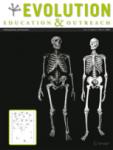
The latest issue of Evolution: Education and Outreach — the new journal aspiring to promote accurate understanding and comprehensive teaching of evolutionary theory for a wide audience — is now published. The theme for the issue (volume 3, number 4) is "Teaching Phylogenetics," and articles by Edward O. Wiley, Deborah McLennan, Marcus Kumala, and Laura R. Novick, Kefyn Catley, and Daniel Funk discuss the importance of phylogenetic systematics in modern evolutionary biology and present ways of incorporating it in high school biology curricula. Articles by Anastasia Thanukos and Richard P. Meisel continue the emphasis on evolutionary trees; articles by Craig Tollini and Jess White and Allan Mazur discuss the results of surveys on "intelligent design" and modern earth science; Bartosz Borczyk reports on creationism and the teaching of evolution in Poland; Finn R. Pond and Jean L. Pond ponder "Scientific Authority in the Creation-Evolution Debates" — and there's much more besides!
Also included is the latest installment of NCSE's regular column, Overcoming Obstacles to Evolution Education. In "Why Are There Still Monkeys?" NCSE's W. Eric Meikle and Eugenie C. Scott address the popular misconception about evolution encapsulated in the question, "If humans evolved from monkeys, why are there still monkeys?" Diagnosing the misconception as stemming from the assumption that evolution is linear and anagenetic, they comment, "What is missing from this view of evolution is the crucial role of branching or splitting in creating the tree of life, and suggest, "Perhaps the easiest way to introduce a more accurate model of the relationships of contemporary species is through the analogy of human family categories, and especially that of 'cousins.'" Meikle and Scott add, "No one would ask, 'If you evolved from your cousin, why is your cousin still here?' ... The question 'if humans evolved from monkeys, why are there still monkeys?' is equally absurd to an evolutionary biologist."
